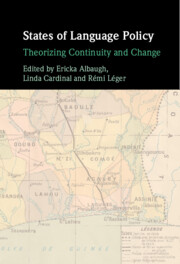Refine search
Actions for selected content:
11 results
Decoding upgrading in middle-income countries: the political economy of IT industrial policy in two Mexican states
-
- Journal:
- Business and Politics , First View
- Published online by Cambridge University Press:
- 11 June 2025, pp. 1-24
-
- Article
-
- You have access
- Open access
- HTML
- Export citation
Do the Lights Stay on? Deployment and Withdrawal of Peacekeepers and Their Effect on Local Economic Development
-
- Journal:
- British Journal of Political Science / Volume 55 / 2025
- Published online by Cambridge University Press:
- 13 February 2025, e25
-
- Article
-
- You have access
- Open access
- HTML
- Export citation

States of Language Policy
- Theorizing Continuity and Change
-
- Published online:
- 14 November 2024
- Print publication:
- 21 November 2024
5 - The Paternalist Policy Style
-
- Book:
- Local Politics and Social Policy in China
- Published online:
- 21 July 2022
- Print publication:
- 04 August 2022, pp 117-142
-
- Chapter
- Export citation
6 - The Mixed Policy Style
-
- Book:
- Local Politics and Social Policy in China
- Published online:
- 21 July 2022
- Print publication:
- 04 August 2022, pp 143-161
-
- Chapter
- Export citation
1 - Introduction
-
- Book:
- Local Politics and Social Policy in China
- Published online:
- 21 July 2022
- Print publication:
- 04 August 2022, pp 1-30
-
- Chapter
- Export citation
7 - Center–Local Relations, Pandemic Politics, and Local Policy Styles in Comparative Perspective
-
- Book:
- Local Politics and Social Policy in China
- Published online:
- 21 July 2022
- Print publication:
- 04 August 2022, pp 162-171
-
- Chapter
- Export citation
3 - Disaggregating Authoritarian Governance
-
- Book:
- Local Politics and Social Policy in China
- Published online:
- 21 July 2022
- Print publication:
- 04 August 2022, pp 55-85
-
- Chapter
- Export citation
4 - The Pragmatist Policy Style
-
- Book:
- Local Politics and Social Policy in China
- Published online:
- 21 July 2022
- Print publication:
- 04 August 2022, pp 86-116
-
- Chapter
- Export citation

Local Politics and Social Policy in China
- Let Some Get Healthy First
-
- Published online:
- 21 July 2022
- Print publication:
- 04 August 2022
Latin American Politics and the Subnational Comparative Method: Vertical and Horizontal Challenges
-
- Journal:
- Latin American Politics and Society / Volume 62 / Issue 3 / August 2020
- Published online by Cambridge University Press:
- 29 June 2020, pp. 149-172
-
- Article
- Export citation
